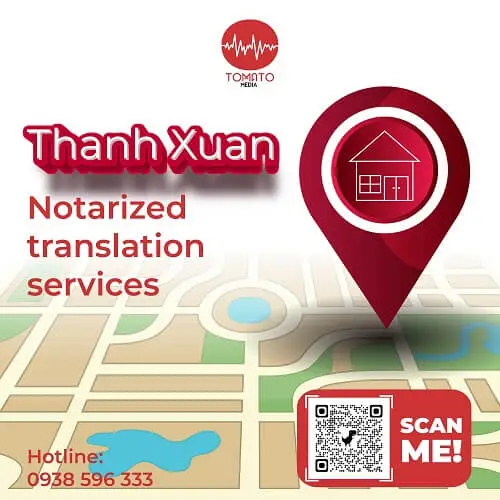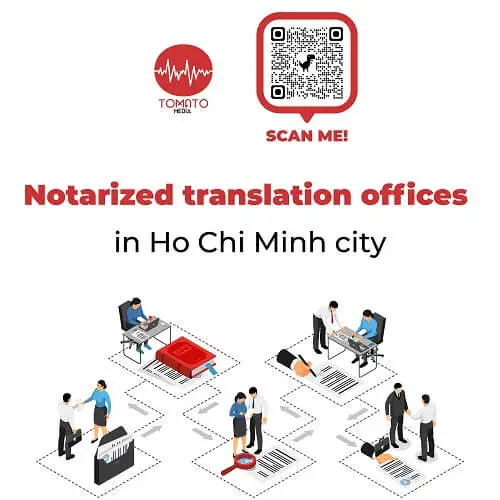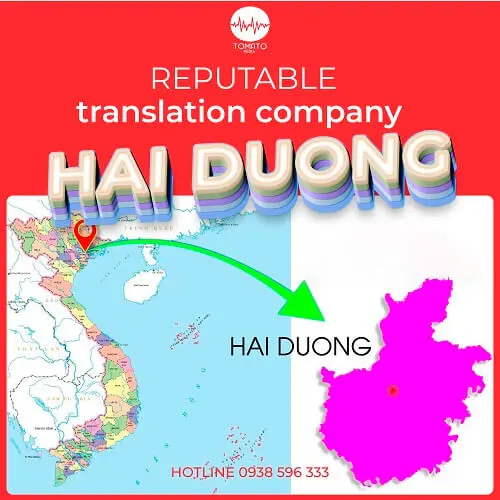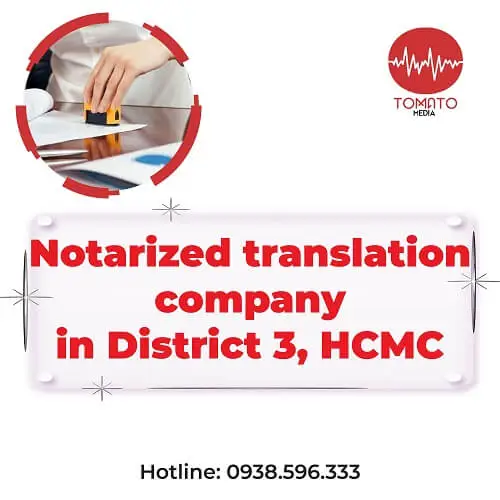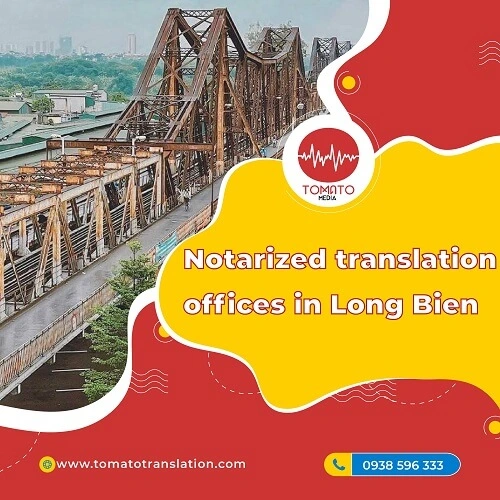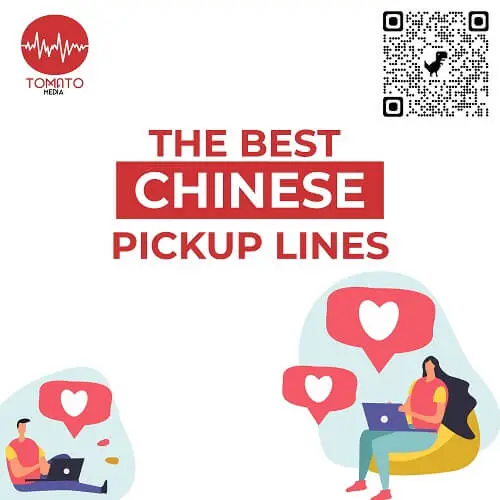When looking for a notarized translation company in Thanh Xuan, do you have any concerns? Want an accurate translation with the correct use of terminology Want to receive the translation quickly, even get it within the day but still ensure the quality Want to save time and effort to apply for a notary seal [...]
Difficulties in the translation process
The translation profession offers many opportunities but also comes with many challenges. Language differences present challenges in translation, necessitating a deep understanding of both languages and cultures on the part of the translator.
Tomato Media is a professional, high-quality multilingual translation company. If you need translation services, contact us immediately!
NỘI DUNG (CONTENT)
Difficulties in the translation process
Here are the difficulties in translation that many people have to face and how to overcome them to make the translation better.
Huge vocabulary
Vocabulary is one of the important factors affecting the translation process. If you do not have a good vocabulary, your translation process can be difficult and take a long time.
Solution: Many translators have overcome this challenge by regularly reading a large number of books and documents to increase their vocabulary knowledge of their strong languages.
Not mastering specialized terminology
Professional knowledge and language skills are important and mandatory for translators. If you only master the language but do not know the industry you are translating into, you may waste time or even make mistakes when translating specialized terms. Solution: To translate well, you need to learn, read a lot of documents about the subject to be translated, ask customers about the specialized terms, and build a term base about that field for later use.
Polysemous words
In some languages, such as Vietnamese, there are many homonyms with different meanings, words with exactly the same pronunciation but different meanings in each situation.
Solution: The translator in the translation process must be very careful and read the source text carefully to understand the full meaning before proceeding with the translation.
Lack of specialized knowledge
When translating documents with specific elements, such as techniques, laws, etc., you need to have basic knowledge of that field. Some documents may be filled with technical jargon or details about specific procedures or activities, causing difficulties for many translators.
Solution: Translators need to read a lot to gain more in-depth knowledge and to catch changes in that field. Besides, you can contact industry experts or customers for help.
The structure of language
This is one of the common difficulties in translation. The structure of sentences in other languages may be different. For example, in English, adjectives are placed before nouns, but in French, adjectives come after nouns.
Solution: To overcome this difficulty, you should have a thorough knowledge of that language. To ensure that the sentence structure is correct while maintaining the meaning and understanding of the original document, you should use grammar-checking tools and other supporting techniques when translating.
Cultural differences
Culture is a barrier that creates a big challenge when translating because each locality has a very different culture, and if the translation is not appropriate, it can be uncomfortable for local readers. For example, the British are famous for their sarcastic words that make people laugh. However, this kind of humor may not be appreciated in many other countries.
Solution: Before translating into a language, you should become familiar with the dialects and the most widely used colloquialisms in that language. Also, regularly read books, watch movies, watch TV shows, and read magazines in that language to improve your knowledge of local culture and dialects.
The style varies by document type
Depending on the type of text to be translated (documents, records, books, stories, magazines, etc.), there will be different styles. Translators need to be skilled and flexible in their use so that the translation is smooth, natural, and suitable for the reader. For example, technical documents are rigid and quite dry, but a good translator knows how to bring out a friendly translation instead of translating word for word.
Solution: To understand the style of many types of translation, you need to diligently read many documents in the language to be translated.
Context-based translation
Because each language has distinct meanings, sentence structures, and expressions, each language has a unique method of translation. For example, Vietnamese slang words and reduplication are difficult to translate into English.
Solutions to these difficulties: When translating, translators must base their choice of sentence on the context rather than translate each language consistently. In addition, practice is essential to familiarize yourself with different contexts and to practice reflexes in a variety of texting situations.
Limited time
Limited time is the most common problem that translators face every day. If it is a simple document, then you can finish it in a short time. But when it is a technical or legal document that requires a proper understanding of the terms or dialects, it takes a long time to learn and look them up.
Solutions to overcome difficulties: You should resort to translation support tools such as: Google Translation, Linguee, Wordfast, Adept Translator Pro, etc. to speed up the translation process.
See also:
- Find out in detail about the most popular types of translation today
- An overview of translation:
https://tomatotranslation.com/en/what-is-translation-considerable-factors-about-translation/
Difficulty in multi-language translation
The field of translation is very diverse, with many types of documents; each type has its own difficulties that present many challenges to translators.
Localization
To be able to deliver a product that ensures content accuracy as well as closeness, clarity, and cultural relevance with native speakers, this type of translation calls for a high level of expertise. These difficulties in the localization come from:
- Due to its updated nature, game localization uses too many slang terms to draw in players. Slang words, euphemisms, and homonyms are difficult for translators who localize game content.
- You won’t be able to adapt your translation style to the natives without a solid understanding of the local culture.
- Forms of address and character names may cause misunderstandings if the translator is not fully aware of the context, circumstance, and meaning of the original. For example, for video/movie localization, the character name Doctor Strange cannot be literally translated as “Bác sĩ Lạ”. Or in many situations, the character named Law in the One Piece series is localized as “brother Luat” in Vietnamese, which greatly reduces the quality of the translation.
Solutions:
You need to develop your language abilities as well as your cultural knowledge in order to get past these obstacles. Besides, if you’re not good at editing videos, you’ll need to work with video editors and audio studios to create high-quality multimedia elements.
Media translation
Media translation can make it difficult for you because this type of specialized translation requires you to have:
- The ability to read, write, and listen well so as not to be confused by someone speaking too fast or whose voice is difficult to hear.
- A cultural understanding to deliver an accurate translation in accordance with local customs and practices.
- The ability to use subtitle software and media processing tools
Solutions:
You need to regularly practice listening in different dialects and learn how to use tools and software that support subtitling and dubbing.
Book translation
- A high volume of translation: A typical book is several hundred to several thousand pages long. This will create challenges and greater pressure for translators than with other types of documents.
- Requirements for in-depth professional knowledge: To translate books well, translators need to have good expertise and extensive experience. It takes a lot of mental effort and book content knowledge for a translator to accurately and effectively translate a book.
- Knowledge of the language to be translated: This is a mandatory requirement for translators. Books are now written in a variety of languages, so accurate and understandable translations require translators with multilingual skills.
Solution:
You need to build yourself a clear work plan to avoid being overloaded and pressed for time. Besides, you should hone your multilingual translation skills and your knowledge of local life and culture.
Document translation
There are many types of documents, such as reports, minutes, contracts, personal documents, all kinds of documents, specialized documents, etc. Each type has its own characteristics, its own expression, and its own specialized terms, as well as its own format. All of these factors can create translation difficulties.
Solution:
To overcome these obstacles, translators need to read a variety of documents to familiarize themselves with expressions and formats and accumulate vocabulary.
Difficulties in interpretation
Interpretation is a profession that requires high language skills as well as other soft skills. This is considered an area that brings many difficulties when translating.
It requires extensive knowledge and proficiency in foreign languages
For interpretation tasks, you almost have to translate immediately without having time to think about finding the right words. As a result, limited language skills will leave you confused and unable to communicate effectively. In addition, each profession has its own professional terminology, so if you do not master it, you will not be able to translate it correctly.
The solution to problems:
Interpreters who want to improve their professional skills need to constantly learn and update their language proficiency as well as specialized knowledge. You should not be satisfied with yourself, but continuously improve to accumulate for yourself.
A high sense of discipline
Since you serve as a lingual bridge for all of the speaker’s messages, professional ethics are of the utmost importance in this field. Therefore, you need to follow the principle of ensuring accuracy with the original. You absolutely do not add content, personal opinions, or misrepresent the original language. Inaccurate translations may have unintended effects on business relationships or even friendly relations between nations.
The solution to problems:
In the process of working, you must always remind yourself to be honest and adhere to the prerequisite rules of the profession.
Able to work under high pressure
Interpretation is a job with great pressure when you have to listen to information, memorize it, process it, and translate it in a very short time. If you do not have good listening skills and quick reflexes, you will definitely feel extremely awkward. Besides, you need to keep a level head so as not to be distracted by the surrounding factors. In addition, the interpreting profession may have to travel frequently under different climate conditions, which can cause fatigue for many novice interpreters.
Solution:
You must regularly practice listening skills through movies, podcasts, and other media in order to get over this challenge. You should also practice speaking skills to sharpen your responsiveness. In addition, preparing yourself for good health is essential to being ready to accept the pressures of work.
Responsiveness and ability to grasp the speaker’s thoughts
Because of the short information processing time, grasping the speaker’s thoughts and predicting the message they want to convey based on their attitudes and gestures will help you a lot.
The solution to problems:
To achieve this psychological acumen, you should regularly read psychology books and practice a lot to gain experience for yourself.
See also:
English interpreting services are highly appreciated by many customers for their good price and international quality
Having translation problems? Let the experts help you!
- If you have difficulty translating, you can seek the help of experienced translators to ensure the quality of the translation. Tomato Media, with a team of 100+ specialists and more than 3000 collaborators with language skills and in-depth knowledge of many fields, promises to bring accurate products with an accuracy of up to 100%. Coming to Tomato, you can find various types of high-quality translation, such as document translation, book translation, media translation, localization, simultaneous interpretation, consecutive interpretation, etc.
- Besides, Tomato’s ISO 9001:2015 standard working process helps optimize translation time with good translation quality at the most competitive fee. If you need a quote, call us immediately or email your request to info@tomatomediavn.com. Tomato will respond in about 20 minutes.
Understanding that there will be certain obstacles in the translation process, Tomato is constantly looking for solutions to improve translation quality and overcome the above difficulties. Besides, the company focuses on professional training for the translator team to bring customers the highest satisfaction.
Difficulties in the translation are inevitable for those working in the field of translation. Therefore, please contact Tomato immediately for advice and use a variety of high-quality translation and interpretation services with the most competitive fees.
Frequently asked questions about difficulties in the translation process
Here are the frequently asked questions about difficulties in translation that we have compiled:
Have you had difficulties translating legal documents?
-
- Legal systems vary from country to country
- The law of system development and change
- Word choice leaves no room for flexibility
- Structure and punctuation require attention to detail
- Legal translators often work to strict deadlines
Thus, in order to have a highly accurate translation of legal documents, the translator must have knowledge of the laws of the source and target language countries. Moreover, the translator must have a high level of language proficiency and, sometimes, a fast translation speed.
Difficulty translating idioms?
- Context needs to be translated
- The corresponding symbolic image
- Need to understand the culture, habits, customs, geography, and environment of the 2 countries of the source and target languages
- Translators need to understand any idioms before they can translate them
Experiences in dealing with common problems when translating?
- Need a translation notebook: include notes, terms, preferred address, etc. (recommended online notebook). The handbook is properly organized by topic, so if necessary, it can be easily looked up.
- Store all implemented translation projects (confidential)
- Join the prestigious translation community, exchange, and consult about issues
- Continuously improve language skills as well as knowledge of the cultures and societies of the source language and the target language countries.
What is the difficulty in translating specialized terminology?
- Lack of specialized knowledge;
- In the target language, there is no word with an equivalent meaning to the term;
- Some specialized sentence structures will differ from the usual sentence structure.
- Some words have specialized meanings that are distinct from their commonly understood meanings;
Solution: Translators need to focus on carefully studying the information about the field in the document they are translating. Look up specialized vocabulary from Dictionary sources or reputable language software. Also, consult or receive advice from experts who have been working in this industry.
Difficulties in website translation
- Easy to abuse translations from software and applications
- Translated sentences must ensure not to break the design layout of the website, banner, poster, etc.
- Incorrect context error, etc.
- SEO optimization for keywords translated in accordance with the search trends of the target language user
Solution: thorough research of website content that needs localization and specialized keywords. Consult with the website design team and SEO technical staff to ensure the title and word information are translated with the right number of letters required, the website form is easy to understand, and keywords hit the user’s search tendency, etc.
How difficult is consecutive interpreting?
- The speaker is so absorbed in the matter at hand that he or she forgets the presence of an interpreter;
- The speed of the speaker is too fast, so the interpreter cannot interrupt him or her;
- The speaker’s way of speaking is not smooth; he or she hesitates many times or stops too soon, making it difficult for the translator to understand correctly.
- The speaker understands the target language, so it is likely that he will interrupt to correct the translation;
- The interpreter has not finished translating, the speaker has already started to say the next point, etc.
With the above interpreting difficulties, interpreters are required to use the source language and target language smoothly and understand the specialization to be translated. At the same time, it is necessary to train the ability to memorize and master shorthand skills. This will help the interpreter not be confused by too long or too fast statements from the speaker.
In addition, before the presentation, it is necessary to arrive early to check the audio equipment and talk in advance with the speaker to grasp the focus of what they will share during the event.
Difficulties in novel and poem translation
- The text contains many slang and dialects that have meaning in the source language culture but not in the target language culture
- For poems, especially ancient ones, alliteration and rhymes are often considerably complicated. If the translation is not good, it will lose the uniqueness of the rhyme, leading to the meaning of the verse being changed
- The translation should properly express the spirit, style and expression of the source language author
- Showcase the humor and satire of the original work
- The native culture of the original language differs completely from the culture of the target language
Translators need to have good language skills, good writing skills, and an understanding of the culture, grammar, and sentence structure of both the source and target languages. Moreover, before translating, it is recommended to carefully read the original content of the work in advance. This should be done to ensure high accuracy for translations that are easy to understand for the user of the target language as well as to keep the spirit of the content of the work and the message of the author.
| Ready to get started? |
Have a large project? |
| GET A QUOTE | ✉ CONTACT US |



